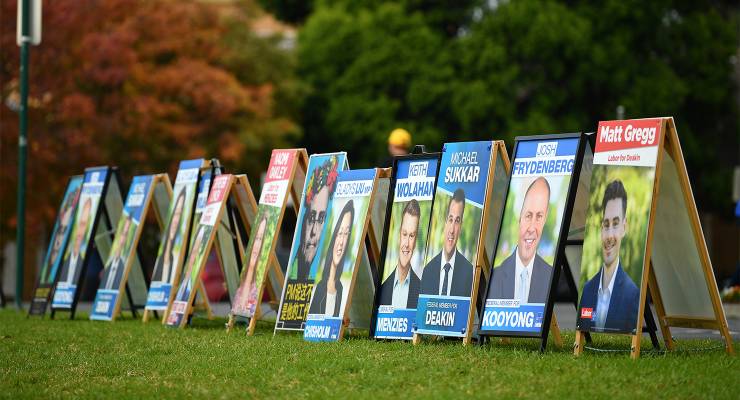
It’s ostensibly a nod to political transparency and probity in federal politics, but experts in governance and law have long said serious shortcomings attend the Australian Electoral Commission (AEC) data published annually under federal donations laws.
“Every year, there are large pools of money, the origin of which is not identified,” said Bill Browne, the director of democracy and accountability with the Australia Institute.
“It could be perfectly innocuous — many small donors, for instance — but the lack of transparency means we can’t answer questions about whether there is some deeper problem going on with these funds.”
More than $3 billion in income has flowed to political parties over the past two decades, with the origins of more than one-third of that sum obscured or cloaked in secrecy.
Last year alone, nearly 40% of party income, or $68 million, was of unexplained origin.
According to the Centre for Public Integrity, it’s a circumstance enabled by a series of weaknesses and loopholes in disclosure laws passed with bipartisan support.
Among the most obvious of these is the high disclosure threshold for political donations, currently set at $14,500, allowing donors to conceivably make multiple undisclosed donations under that threshold.
This same high threshold also applies to a larger, broad-sweeping category of income called “other receipts”, described by Browne as “really problematic” due to its tendency to disguise the ultimate source of the cash.
The category, he said, can include anything from returns on investment from so-called “associated entities” as well as public funding, loans received, payments for services and dividends on shares.
“The thresholds for disclosing donations and income are too high,” he said. “It means Australians never get a full picture of the money that’s funding our political parties and candidates and how influence is operating.”
Other gaps flagged include the narrow definition assigned to “gifts” or “donations” under disclosure laws, which do not extend, for example, to donations made at party fundraisers, commonly priced at up to $20,000 per person.
Rightly or wrongly, these factors fuel arguments around state capture and the perception that the game of politics is weighted against the public interest.
On Wednesday, the AEC published data revealing that the Liberal-National parties had disclosed more than $116 million in funding for the 2021-22 financial year, Labor $124 million, and the Greens more than $10 million.
Analysis undertaken by the Centre for Public Integrity suggests just a small handful of donors comprise around three-quarters of all donations.
“Given the reliance that the major parties have on these top donors, there is a real risk that they receive special access and yield undue influence on our decision-makers,” former NSW Court of Appeal judge Anthony Whealy KC told The Age.
“We urgently need a cap on political donations so that an average voter can match the donations of millionaires.”
But Browne said care would need to be exercised on this front, lest any reform inadvertently entrench the dominance of the two major parties to the detriment of independents or minor parties.
“Political donations caps are worthy, but they would need to be carefully designed to avoid unfairly disadvantaging challengers or independent candidates as opposed to incumbents,” he said.
“What the annual AEC data dump really reminds us is that we get information on political contributions very late, often months and months after the contribution has been made.
“If we had real-time disclosure [laws], voters would be able to weigh up the merits of these contributions at the time they occur and how they might influence political parties and politicians.”
The federal government has indicated it will likely reduce the disclosure threshold for donations and contributions to $1000, bringing it in line with thresholds set in many states across Australia.
And while it is also considering the merits of real-time disclosures, bans on large political donations appear to have been ruled out for the foreseeable future.








Donations are bribes. Always were, always will be. Bribing a party is much easier than bribing politicians individually. The people calling the shots within the party are the crims. They take the bribes, control the money and dictate policy in the fields from whence cometh the money. Such policy is always contrary to public benefit, otherwise no bribe would be needed. Once that policy is in place and the public has accepted it as normal future bribes steer policy more easily: simply to not change, to keep it in place and enhance it. This is where we are at with climate policy, aged care policy, NDIS, housing, immigration even. You may doubt this, but ask yourself why is it Government policy to allow new gas fields to be opened up? How come Nonna is fed on $6 a day? Why is that old $100,000 house selling for a million? It’s all bribery, corruption and a few ripping off the many, with the many apparently content to cop it sweet and even help maintain the system.
I don’t like to criticise and offer no solution, so here it is. Vote for someone else.
Generally true in the case of very large amounts from individuals, or even more so, organisations.
But not in the case of widespread small donations from grassroots support.
Thanks Maeve.
For mine, I’m less concerned with donation caps than donation thresholds. It’s the secrecy of donations that is more of a threat to democratic accountability than with their sources.
Anonymity isn’t a problem if the most anyone can donate is low (as long as it’s tracked behind the scenes so an individual maximum per year can be applied).
Knowing who is donating squillions won’t really change anything in a practical sense.
All donations are bribes, so it’s essential to know who is bribing whom.
Yes it will, it will tell us who is bribing whom.
If some random person donating ten bucks to a candidate they like or agree with, but don’t know and will never meet in person, constitutes a “bribe”, then the term has lost any useful meaning it may have had.
Does it matter ? Do you think you’re going to find anything surprising ? Shame the shameless ?
‘Donations’ are already just a tiny bit more than a mere ‘risk’ for influencing parliamentary decisions. ‘Lobbying’ is every bit as venal and both are little more than ‘seed’ money to get what the instigators want. What really riles me are the attempts by apologists at making some aspects of these tawdry practices sound somehow ‘worthy’ or ‘wholesome’. The combined effort that goes into ‘guiding’ of our pollies is blatant and bent and by and large the recipients are (a) willing and (b) reluctant to stop. They won’t.